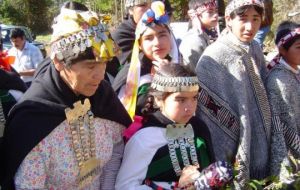MercoPress. South Atlantic News Agency
The Chilean state apologizes to the indigenous Mapuches 'for taking their lands'
 The government of President Bachelet also admits the social debt and promises “no more of the same”
The government of President Bachelet also admits the social debt and promises “no more of the same” The government of President Michelle Bachelet on Thursday apologized in the name of the Chilean state to the indigenous Mapuche tribe “for taking their lands” and said it has a pending debt in terms of public policies that will allow the La Araucania region, where 600,000 of the Indians live, to emerge from poverty.
The statement was made by the new governor of the zone, Francisco Huenchumilla, one of the regional officials named by newly inaugurated President Michelle Bachelet.
In Araucania, indigenous militants have torched vehicles, highway toll booths and lumber shipments as part of a struggle to reclaim lands the Mapuches lost during a 19th century “pacification” campaign. Those lands are now largely occupied by lumber and agricultural interests.
“The state's payment of this debt is pending and for more than 130 years it has implemented public policies that have not managed to bring this region out of poverty and from among the last areas of national development,” the governor said.
“To achieve this, I express, in the name of President Michelle Bachelet, the political will to do something different. No more of the same,” he emphasized.
Huenchumilla, himself a Mapuche, said that to move forward along this road he will meet with all the organizations of the productive sectors that “have been affected by the violence,” given that in this new scenario “all must be heard.”
The governor also called on prosecutors of the region to collaborate in creating a climate of respect and tolerance in the area, saying, “We must calm the spirits.”
On that subject, the president of the prosecutors association, Claudio Uribe, on Thursday repudiated the governor's remarks.
”The prosecutors, despite the scanty resources we have, will act in an absolutely serious way and (will) adhere to the principle of objectivity,“ Uribe said.
Huenchumilla also alluded to the restraint in the application of Chile's draconian anti-terrorist law, which was invoked on four occasions during Bachelet's first term as president, from 2006-2010.
Bachelet has said ”it was an error“ to apply the anti-terror law, which dates from the 1973-1990 Pinochet dictatorship, and vowed not to invoke it again within the framework of the ”Mapuche conflict.”
The law was modified midway through the 2010-2014 presidency of Sebastian Piñera to guarantee due process, a measure that was adopted after a long hunger strike by jailed Mapuche activists.
A Mapuche leader was sentenced last week to 18 years in prison for the January 2013 arson deaths of an elderly couple in Araucania. The conflict has also claimed the lives of three Mapuches and a Carabinero officer, while dozens of indigenous activists have been jailed.




Top Comments
Disclaimer & comment rules-

-

-

Read all commentsThe thing is…. When is Argentina going to do the same? They claim that the Indians they slaughtered came from Chile, but in the days before Spain colonised Patagonia there were no borders. Borders were the invention of the European colonists, the same people that now call themselves Argentines. Perhaps the venerable Think or academic Axel can explain?
Mar 14th, 2014 - 09:50 am 0Batchelet is saying the right things, we will see if she manages to “rectify” the matter against the companies who own the land now.
Mar 14th, 2014 - 11:15 am 0Tough call, that one. I guarantee she will never please everybody no matter what she does.
I'm not against the Mapuche people for their claims, but I'm very much against the brutal violence that includes killing of innocent individuals in the south. Here in Colina (Chicureo is a part of the municipalidad) the city recognizes the Mapuche and Spanish language... in that order.
Mar 14th, 2014 - 01:20 pm 0Commenting for this story is now closed.
If you have a Facebook account, become a fan and comment on our Facebook Page!